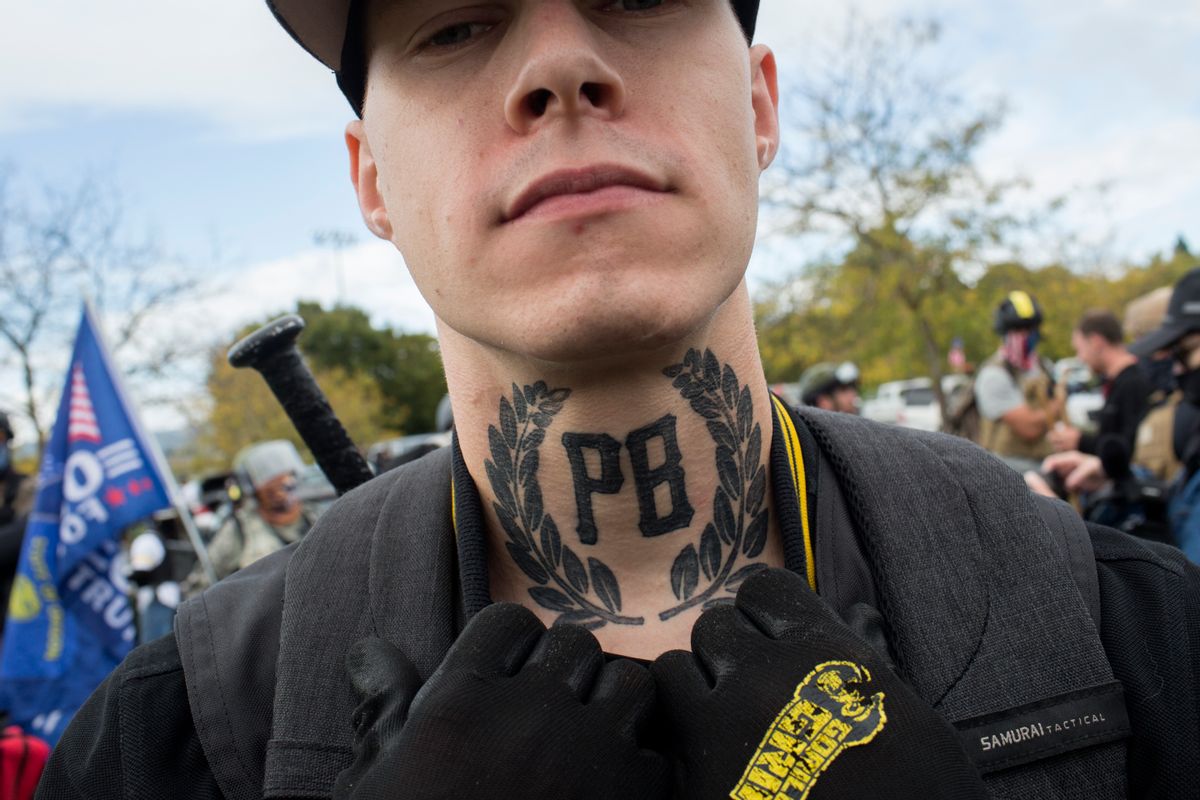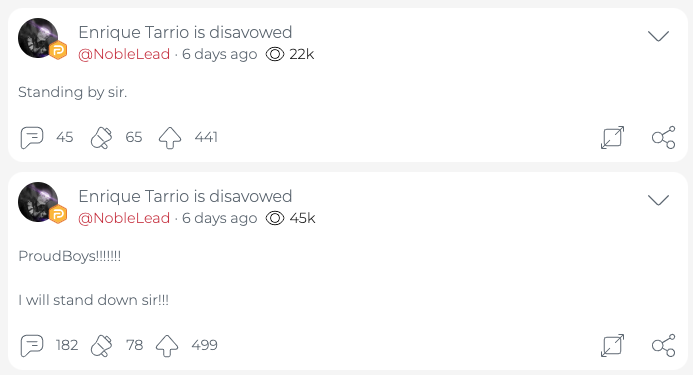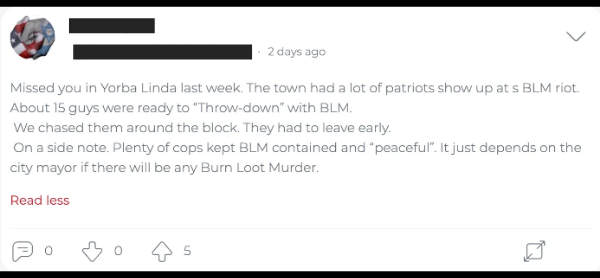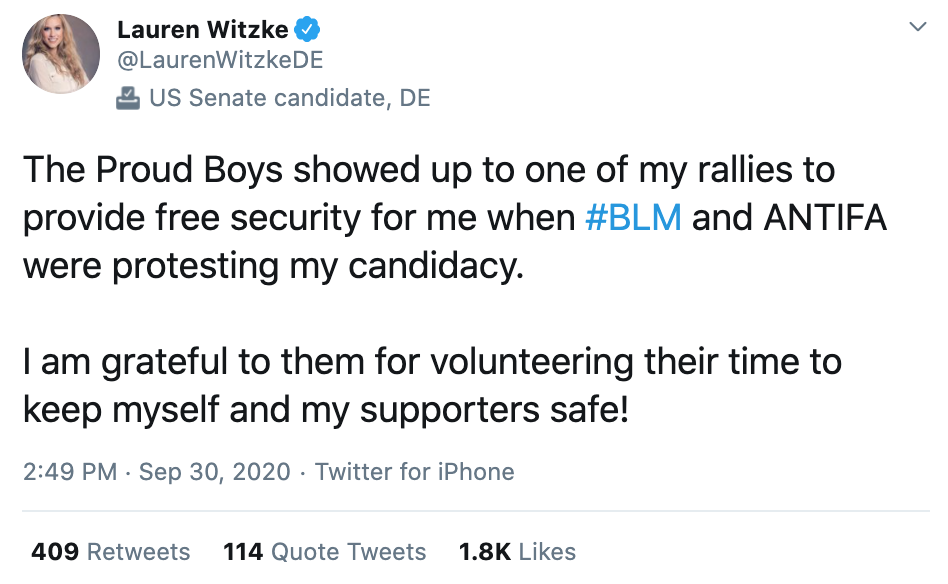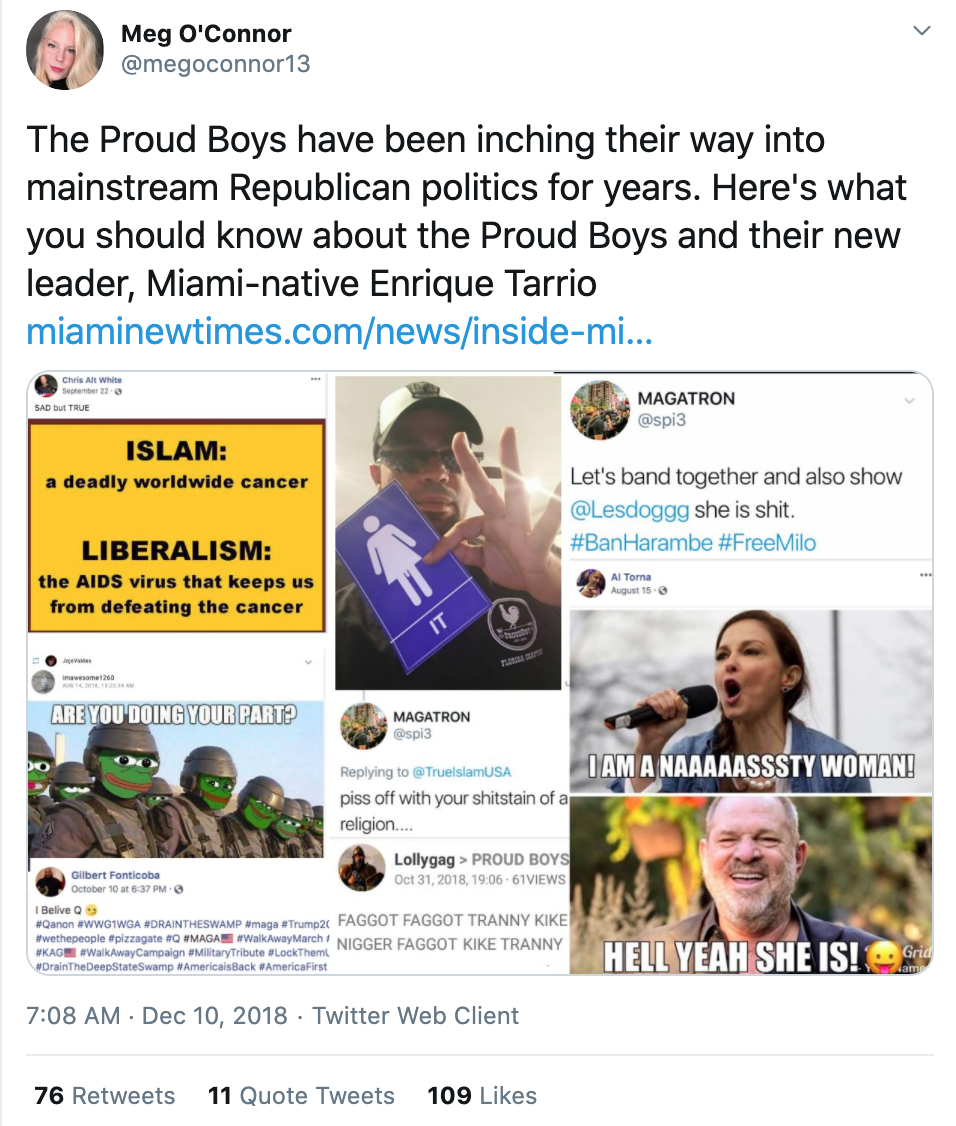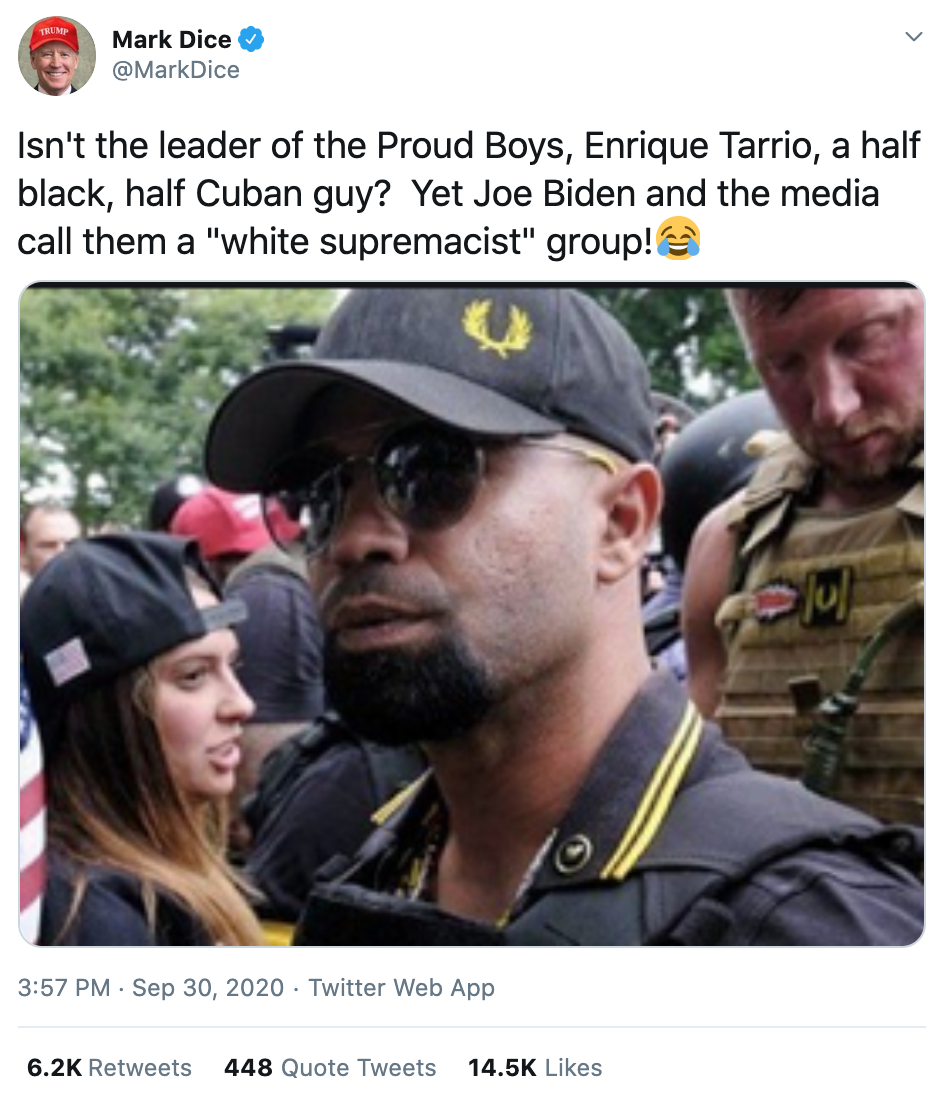Within minutes after U.S. President Donald Trump told the Proud Boys, a far-right group with members who espouse white supremacism, to "stand back and stand by," on national television on Sept. 29, 2020, members of the men-only group took to fringe social media sites to celebrate what they considered a "historic" moment for their ideological push against leftists.
The president's comment — which viewers interpreted as either an endorsement of neo-fascism or an example of his unorganized speaking style — took place on a presidential debate stage with Democratic rival Joe Biden after moderator Chris Wallace asked Trump to condemn white supremacists and militia groups, and he did not do it. The scene unfolded like this:
Trump: — I would say, I would say almost everything I see is from the left wing, not from the right wing —
Wallace: So what do you, what are you saying?
Trump: I’m willing to do anything, I want to see peace —
Wallace: Then do it, Sir —
Biden: Say it. Do it. Say it.
Trump: Do you want to call them, what do you want to call them? Give me name, give me a name, go ahead —
Wallace: White supremacists and right-wing —
Trump: Who do you want me to condemn? Who?
Biden: The Proud Boys
Wallace: White supremacists and right-wing militias
Trump: The Proud Boys? Stand back and stand by, but I’ll tell you what, I’ll tell you what, somebody’s got to do something about Antifa and the Left…
Two days later, Trump explicitly condemned white supremacists and the Proud Boys, though he also said he "didn't know much" about the latter. The impact of his "stand back and by" comment had already taken hold, however: The president's remarks catapulted the group, which was previously on the fringe of America's political spectrum, into the mainstream spotlight.
Based on our analysis of the Proud Boys' activities online and news reports, the debate almost immediately galvanized members on Parler, Gab, and the encrypted chat app Telegram (corners of the internet where the group is not banned) into screening more potential recruits, circulating images of the president's words on their logo, and searching for hidden meaning behind them. Enrique Tarrio, the group's leader, wrote on Parler: "Standing by sir."
Another person wrote on the site: "[Trump] is not stupid! This is one of the very few times that he was being 'politically correct' in saying he doesn't know the Proud Boys! But, by his 'stand by', he let us know that he appreciates ya'll!"
Below, we explain who the Proud Boys are, what they claim to believe, and how they came to represent a dangerous chasm in America's culture war — operating under the guise of a fraternal organization while receiving the designation of "hate group" from the Southern Poverty Law Center (SPLC), a nonprofit legal advocacy organization that monitors extremist organizations.
How Did the Proud Boys Form?
To unpack the ideologies of the group, we first examined the history of its founder: Gavin McInnes.
He was born in England, raised in Canada, and spent years making wildly racist, xenophobic, or sexist statements under a supposed veil of humor as the co-founder of VICE media. (He left VICE in 2008, citing "creative differences.") Such statements included, per the SPLC:
- In 2002, when he was working for the Brooklyn-based media outlet and was asked by a reporter what he thought about his neighbors in New York's Williamsburg neighborhood, McInnes said, “Well, at least they’re not n------ or Puerto Ricans. At least they’re white.”
- In September 2003, he told The New York Times: "'I love being white and I think it's something to be very proud of,' McInnes said. 'I don't want our culture diluted. We need to close the borders now and let everyone assimilate to a Western, white, English-speaking way of life.'"
- In a 2005 article on VDare.com, a white nationalist hate site, McInnes railed against Canadian multiculturalism and lamented that Jared Taylor — the editor of a publication that features proponents of eugenics and anti-Black racists — had not been invited to speak at an event. (Ten years later, McInnes welcomed Taylor onto "The Gavin McInnes Show," where Taylor spent more than an hour explaining why he believes white people are “better” than African Americans.)
By the time of Trump's 2016 presidential race against then-Democratic rival Hillary Clinton, McInnes had established himself as a right-wing media provocateur and used that notoriety to start what he called a "pro-Western fraternity" in New York City, or essentially what he attempted to brand as a drinking club to celebrate Western chauvinism. Within months, various Proud Boys online forums and monthly in-person meetups across the country created a space for frustrated young men of various beliefs, ranging from free speech activists to violent white supremacists, to pass off offensive remarks by calling them ironic or jokes.
"We love Trump,” McInnes said in a December 2018 interview with ABC News. “[Election night 2016] was just heaven, and we thought, 'finally, all of this politically correct pandering, all this pedantic social justice warrior stuff, it’s going to at least take a break.'”
As of this report, local chapters exist in most states and several countries, including Japan and Australia. Each local group maintains a hierarchy of members based on whether they endured initiation rituals, promised to stop masturbating or watching porn, or got a Proud Boys tattoo, among other things.
In short, according to the group's website, each member must declare himself "a Western chauvinist who refuses to apologize for creating the modern world" — which means they want to adhere to traditional gender roles, close national borders, give every American a gun, and end government welfare and "anti-racial guilt" — and share a common hatred for Americans on the country's far political left, including critics of Trump and fascism.
According to Heidi Beirich, an expert on far-right politics who co-founded the Global Project Against Hate and Extremism, the Proud Boys exhibit an oversized presence in politically fractious situations, such as during protests against police brutality and racism in Portland and Seattle in 2020, The Washington Post reported. She estimated there are hundreds of Proud Boys members overall, though it is unclear as of this writing how the president's remark at the debate would impact membership. Several Parler and Facebook users expressed new interest in joining or supporting the group after the shoutout, according to a Snopes analysis.
Why Are Proud Boys Considered a Hate Group?
Before and during the group's existence, McInnes advocated brutal tactics against the group's enemies — people against fascism or critics of Trump — and exhibited a clear pattern of promoting of anti-Muslim, misogynistic, racist, transphobic, and anti-Semitic beliefs. In a June 2016 episode of the “Gavin McInnes Show,” McInnes said, “We will kill you. That’s the Proud Boys in a nutshell. We will kill you,” per the Anti-Defamation League, another anti-hate organization.
The SPLC stated: "[Violence] is firmly entrenched in Proud Boy dogma. McInnes was filmed punching a counterprotester outside of the Deploraball in January 2017, and after a speaking engagement at New York University the next month turned violent, he wryly declared, 'I cannot recommend violence enough. It’s a really effective way to solve problems.'"
The group's ideals inspired another member, Kyle Chapman, to create a “tactical defense arm” of the group called the Fraternal Order of Alt-Knights. Chapman, who faces a felony charge after video recordings showed him hitting counterprotesters with a wooden cane in Berkeley in March 2017, has led rallies nationwide and has given media interviews in which he promotes both the Proud Boys and outright white nationalism. “You’re maybe gonna have to do some time in jail and you very may well have to die," Chapman told a crowd of supporters at a July 2017 Unite America First Peace Rally in Sacramento. "I’m willing to die. Are you guys willing to die?”
Of the Proud Boys' relationship to Chapman's "defense arm," the SPLC wrote: "To Proud Boys leadership, the partnership only made sense and was, in fact, necessary for the progress of their movement: with violent 'neo-Marxists' stopping at nothing to destroy Western civilization, a contingent of men should be in place to defend against the ever-present threat. "
In fall 2018, Facebook, Twitter, and Instagram started banning content linked to the Proud Boys and McInnes, citing the platforms' prohibition on hate groups or violent extremists. Then, in summer 2020, YouTube suspended McInnes for a similar reason: violating that platform's rules against hate speech.
Members adopted different venues for recruiting people and circulating memes, including Telegram and Parler, which branded itself as "the free speech network" and emerged during the Trump presidency as not only a retreat for the Proud Boys but for other far-right groups frustrated by mainstream platforms' censoring of hate speech. As an example of social media chatter inciting or endorsing physical intimidation, one person wrote this on Parler following the president's mention of the Proud Boys at the presidential debate, per a screenshot captured by Snopes:
"About 15 guys were ready to 'Throw-down' with BLM," the post says, in reference to the Black Lives Matter movement against the unjust killings of Black Americans by police. "We chased them around the block. They had to leave early."
In sum, the SPLC has designated the Proud Boys a hate group for the following reasons:
Their disavowals of bigotry are belied by their actions: rank-and-file Proud Boys and leaders regularly spout white nationalist memes and maintain affiliations with known extremists. They are known for anti-Muslim and misogynistic rhetoric. Proud Boys have appeared alongside other hate groups at extremist gatherings like the "Unite the Right" rally in Charlottesville.
Other hardcore members of the so-called "alt-right" have argued that the “western chauvinist” label is just a “PR c--- term” McInnes crafted to gain mainstream acceptance.
What Are Some Documented Episodes of Violence?
The group over the years became known for counterprotesting anti-Trump demonstrations in cities such as Seattle, Portland, and Berkeley, or staging their own rallies to supposedly show their tolerance for "free speech." Members' signature uniform consisted of a yellow-trimmed black Fred Perry polo with a laurel wreath, typically accessorized with the Trump campaign's red MAGA hat, American flag symbols, or bulletproof vests. Some Proud Boys also wielded batons, bear mace, or guns at the protests.
In effect, some law enforcement agencies considered the group the equivalent to a street gang looking to fight with people with opposing ideological views, such as far-left protesters against white supremacy and Trump. As of this writing, episodes of violence linked to current or former members of the Proud Boys included, per news reports and Anti-Defamation League:
- In August 2017, Jason Kessler, a white nationalist and former Proud Boy, organized the deadly Unite the Right Rally in Charlottesville, where some Proud Boys gathered alongside Klansmen, modern-day Confederates, and other overtly racist groups.
- In October 2018, two members were convicted and sentenced to prison and seven others plead guilty in connection to a fight outside Manhattan's Metropolitan Republican Club where McInnes was speaking.
- In August 2020, at least one Proud Boys member allegedly sprayed mace, fired a paintball gun and pointed a revolver at anti-racism protesters in Portland.
Despite that evidence, as well as documentation of conversations in which Proud Boys describe how they "bait" opponents into making the first move, leaders repeatedly insisted that members only act in self-defense. The ADL stated:
Again, real world events belie the claims made by various Proud Boys leaders. Not only have there been several instances where Proud Boys have engaged in unprovoked violence, their social media conversations also demonstrate how inciting violence and responding to small slights with brutal force is key to the Proud Boys’ strategy. [...] Proud Boys and their allies purposefully organize and act in a manner that will all but guarantee violence.
According to the SPLC, the violent episode in Charlottesville — where 32-year-old Heather Heyer was killed when a car deliberately rammed into a crowd — marked a switch in how McInnes tried to brand the Proud Boys to separate them from more hardcore groups that overtly promote white supremacy and anti-Semitism. The center stated: "It was only after the violence in Charlottesville, when any doubts about the true nature of the movement were stripped away, that Mcinnes attempted to earnestly distance the Proud Boys from the alt-right label. Before that, he seemed content to let the Proud Boys brand appear more ideologically ambiguous, profiting off the alt-right’s rising popularity until things got ugly."
What Does This Mean for U.S. Politics?
The ADL summarized the Proud Boys' political influence like this: "After several years of forging alliances with members of the Republican political establishment, the Proud Boys have carved out a niche for themselves as both a right-wing fight club and a volunteer security force for the GOP. Despite their associations with mainstream politicians, Proud Boys’ actions and statements repeatedly land them in the company of white supremacists and right-wing extremists."
The number of Republican politicians, whether at the city, state, or federal level, who support the Proud Boys is unknown, though evidence linked the group to at least one U.S. Senate candidate and Trump's longtime adviser Roger Stone, who was convicted of lying to federal investigators during their investigation into the campaign's relationship with Russian operatives.
Both Stone and Lauren Witzke, a Republican candidate for Delaware U.S. Senate, enlisted Proud Boys to provide security at events in 2020.
Additionally, Proud Boys Chairman Enrique Tarrio, who succeeded McInnes in fall 2018 and lives in Florida, leads the state's unofficial Latinos for Trump group, as of this report. In February 2019, he was spotted in the first several audience rows of a Trump rally, wearing black sunglasses, a black baseball hat and and a black T-shirt that read, “Roger Stone Did Nothing Wrong!”
Tarrio had attended Florida Republican events for years and launched a brief, unsuccessful campaign to represent a portion of South Florida in the U.S. House of Representatives in 2020. He dropped out of the race before the primary election.
Florida Republican congressional candidate Laura Loomer, a far-right provocateur whose hate speech has gotten her banned from mainstream social media sites, defended the group in a October 2020 interview with Forward, a news outlet for Jewish Americans, and said McInnes is a friend to her. “I think Jewish organizations should be more concerned with Antifa and Black Lives Matter than the Proud Boys,” she said.
In an interview with Business Insider, Tarrio said at least 30 Proud Boys were campaigning for political offices ranging from local City Council seats to U.S. Congress, but he did not identify them, citing concerns for their safety. "People may not even know they're voting for a member of the group," the news outlet reported.
Who Is Proud Boys Chairman Enrique Tarrio?
McInnes announced he was stepping away from the Proud Boys in November 2018 and months later filed a defamation lawsuit against the SPLC, alleging that its "hate group" designation for the Proud Boys erroneously damaged his career. (That case is ongoing as of this report.) Then, Tarrio, 36, a Cuban-American from Miami, took over as chairman.
Responding to a survey during his brief congressional campaign, Tarrio said he was born in Miami to Cuban-American parents, owns several small businesses in the security and surveillance industry, and got involved in political activism in 2005. He said he studied at Miami Dade College and the University of Miami.
According to public records obtained by the South Florida Sun Sentinel, Tarrio has a criminal history that includes theft charges. In 2013, he was sentenced to 30 months in federal prison for rebranding stolen medical devices and reselling them across state lines, according to federal records.
In a December 2018 interview with The Miami New Times, Tarrio said he was attracted to two of the Proud Boys' ideals — glorify the entrepreneur and abolish prisons — since he said he saw firsthand that the prison system isn't helping reform anyone. (We should note here: Proud Boys did not list abolishing or dismantling the prison system as a core value on its website.) He defended members' offensive posts, including homophobic and racial slurs and rape jokes, as free speech. Tarrio himself at one point called African American actress Leslie Jones an "ape," called Islam a "shitstain of a religion," and referred to transgender people as "it" on social media, per the newspaper's analysis.
Also in 2018, Tarrio was captured in video footage representing the Proud Boys and heckling then-House Minority Leader Nancy Pelosi at a campaign event, yelling: "You don't belong here, you fucking communist."
Does the Group Only Allow White Members?
No, but that doesn't mean the group doesn't promote racism (we'll explain more below).
First, members of the Proud Boys represent a range of ethnic backgrounds, and leaders have repeatedly said they will screen any man who wants into the group — regardless of of his sexual orientation, voting record, or race.
That, according to supporters, is evidence of the group's inclusiveness and discredits allegations of racism and bigotry — as well as the fact that their leader identifies as Afro-Cuban. Wilfred Reilly, a political science professor at Kentucky State University, told the conservative media outlet, The Washington Times: "The Proud Boys are openly right-leaning group and they’ll openly fight you. They don’t deny any of this, but saying they’re white supremacist, if you’re talking about a group of people more than 10% people of color and headed by an Afro-Latino guy, that doesn’t make sense."
But what's missing in that logic is the clear pattern of social media posts and statements by Proud Boys members that promote white supremacy, as well as members' associations with extreme white nationalists. No matter how leaders attempt to control the narrative and brand the Proud Boys as a benign, men-only drinking club, documented evidence shows otherwise, according to findings compiled by the anti-hate groups.
Such a rhetorical strategy is known to scholars of white nationalist and extremist groups. Sociologist Rogers Brubaker, for instance, said the concurrent embrace of intolerance and inclusion is a recruiting strategy — people who may otherwise hold an aversion toward extremist groups might join because of the ideological muddiness, and the organization could grow to gain mainstream acceptance among journalists, politicians, and the public, per the SPLC. The center added:
The Proud Boys’ pro-western posture allows them to position themselves — somewhat counterintuitively — as a tolerant and progressive social force. If Islamic backwardness, as they imagine, threatens gay people and women, then they serve as their guardians by protecting and promoting “western values.” Their opposition to Muslims and Islam, improbably, stands as a marker of their own tolerance. In that way, their ideology is similar to many European far-right groups — like the French National Front and Danish Party for Freedom — who push hardline anti-immigration policies at the same time they call for greater tolerance in the form of secularism and gender equality, all the while attempting to distance themselves from overt racists.
In other words, Proud Boys are "utter exemplars of plausible deniability and wanting to have it both ways," to keep followers, said Alexandra Minna Stern, a University of Michigan professor and researcher of eugenics in the U.S.
One former member told ABC News reporters he left the Proud Boys after the deadly Charlottesville rally because — while the group was not "solely responsible" for the violence there — its meetings and online forums provided "a safe haven for those kinds of racists ideas."
"Everybody is not perpetuating violence, but the complicitness in knowing that there's violence going on, the complicitness in that you're not checking people who have racist and violent tendencies makes you part of the problem," the ex-Proud Boy said.
